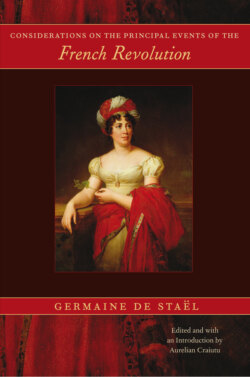Читать книгу Considerations on the Principal Events of the French Revolution - Germaine de Stael - Страница 25
На сайте Литреса книга снята с продажи.
ОглавлениеCHAPTER XIII
Conduct of the Last Estates General, Held at Paris in 1614.
The aristocratical party, in 1789, were perpetually demanding the adoption of ancient usages. The obscurity of time is very favorable to those who are not disposed to enter on a discussion of truth on its own merits. They called out incessantly, “Give us 1614, and our last Estates General; these are our masters, these are our models.”
I shall not stop to show that the Estates General held at Blois in 1576 were almost as different, in point both of composition and form of proceeding, from the Paris assembly of 1614, as from their predecessors under King John and Louis XII. No meeting of the three orders having been founded on clear principles, none had led to permanent results. It may, however, be interesting to recall some of the principal characteristics of the last Estates General, brought forward, as they were, after a lapse of nearly two centuries, as a guide to the assembly of 1789. The Third Estate proposed to declare that no power, spiritual or temporal, had a right to release the king’s subjects from their allegiance to him. The clergy, through the medium of Cardinal du Perron, opposed this,1 making a reservation of the rights of the Pope; the nobles followed the example, and received, as well as the clergy, the warm and public thanks of His Holiness. Those who speak of a compact between the nation and the Crown are liable, even in our days, to be considered Jacobins; but in those times, the argument was, that the royal authority was dependent on the head of the church.
The Edict of Nantes had been promulgated in 1598, and the blood of Henri IV, shed by the adherents of the League, had hardly ceased to flow when the Protestants among the nobles and Third Estate demanded, in 1614, in the declaration relative to religion, a confirmation of the articles in the edict of Henri, which established the toleration of their form of religion; but this request was rejected.
M. de Mesme, lieutenant civil, addressing the nobles on the part of the Third Estate, declared that the three orders ought to consider themselves as three brothers, of whom the Third Estate was the youngest. Baron de Senneci answered in the name of the nobles that the Third Estate had no title to this fraternity, being neither of the same blood nor of equal virtue.2 The clergy required permission to collect tithes in all kinds of fruit and corn, and an exemption from the excise duties paid on articles brought into the towns, as well as from contributing to the expense of the roads; they also required further restraints on the liberty of the press. The nobles demanded that the principal offices of state should be bestowed on men of family only, and that the commoners (roturiers) should be forbidden the use of arquebuses, pistols, and even of dogs, unless houghed, to prevent their being employed in the chase. They required, also, that the commoners should pay further seignorial duties to the proprietors of fiefs; that all pensions granted to the Third Estate should be suppressed, while their own body should be exempt from personal arrest and from all taxes on the product of their lands. They asked, further, a right to receive salt from the king’s granaries at the same price as the merchants; and, finally, that the Third Estate should be obliged to wear a different dress from that of persons of family.
I abridge this extract from the Minutes of the Assembly of 1614, and could point out a number of other ridiculous things, were not our attention wholly required by those that are revolting. It is, however, quite enough to prove that the separation of the three orders served only to give occasion to the constant demands of the nobles to escape taxes, to secure new privileges, and to subject the Third Estate to all the humiliations that arrogance can invent. A claim of exemption from taxes was made in like manner by the clergy, and accompanied with all the vexatious demands of intolerance. As to the public welfare, it seemed to affect only the Third Estate, since the weight of taxation fell totally upon them. Such was the spirit of that assembly, which it was proposed to revive in the Estates General of 1789; and M. Necker is to this day censured for having desired to introduce modifications into such a course of proceeding.3
